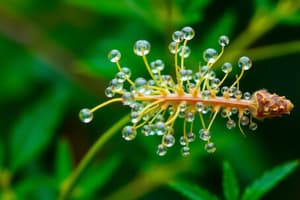Podcast
Questions and Answers
What is the primary focus of Biology?
What is the primary focus of Biology?
- Analyzing the geological formations of the earth
- Investigating the chemical composition of inanimate materials
- Exploring the structure and function of living organisms (correct)
- Studying physical structures of non-living objects
Which scientific discipline studies the inheritance and variation of traits in living organisms?
Which scientific discipline studies the inheritance and variation of traits in living organisms?
- Evolutionary Biology
- Genetics (correct)
- Ecology
- Neurobiology
What does the scientific method provide for exploring the natural world?
What does the scientific method provide for exploring the natural world?
- A method to disregard empirical evidence
- A logical framework for developing testable explanations (correct)
- A process to avoid experimentation
- A way to make subjective observations
In Biology, what does Neurobiology primarily study?
In Biology, what does Neurobiology primarily study?
What is the purpose of analyzing data in science?
What is the purpose of analyzing data in science?
What is the goal of Biology's subdiscipline Evolutionary Biology?
What is the goal of Biology's subdiscipline Evolutionary Biology?
Which groundbreaking discovery changed our understanding of genetics and evolution?
Which groundbreaking discovery changed our understanding of genetics and evolution?
Why is it important to delve into various subdisciplines within Biology?
Why is it important to delve into various subdisciplines within Biology?
How does science contribute to technological advancements?
How does science contribute to technological advancements?
What is the iterative process in science used for?
What is the iterative process in science used for?
Which field did the theory of plate tectonics transform our perception of?
Which field did the theory of plate tectonics transform our perception of?
What role does the scientific method play in uncovering new discoveries?
What role does the scientific method play in uncovering new discoveries?
Flashcards are hidden until you start studying
Study Notes
Science: A Matter of Discovery and Understanding
Science is a systematic enterprise that builds and organizes knowledge in the form of testable explanations and predictions about the natural world. It aims to reveal causal relationships among events, which can be used to predict future outcomes. This pursuit of understanding has led to the discovery of various scientific disciplines, with one of the most fundamental being Biology.
Biology: The Study of Life
Biology is the study of life and living organisms, from microscopic cells to vast ecosystems. It encompasses all aspects of living organisms, including their physical structure, chemical composition, function, development, and evolution. This discipline is further divided into various subdisciplines such as Molecular Biology, Genetics, Ecology, Evolutionary Biology, Neurobiology, and many more. Each subdiscipline delves deeper into specific aspects of life, contributing to our overall understanding of the natural world.
Scientific Method: The Tool for Discovery
The scientific method provides a logical framework for asking questions about the natural world and developing testable explanations based on evidence. It involves:
- Observation: Making accurate and objective observations about the natural world.
- Question: Formulating a question or hypothesis based on the observations.
- Experiment: Designing a test or experiment to answer the question.
- Analysis: Collecting data and analyzing it to determine if the hypothesis is supported.
- Conclusion: Drawing conclusions based on the evidence gathered and revising or discarding the hypothesis if necessary.
This iterative process allows scientists to continue refining their understanding of the natural world through continuous observation, questioning, experimentation, and analysis.
Scientific Discoveries: Changing Our Understanding
Science has led to numerous groundbreaking discoveries that have changed the way we view the world. For example, the discovery of the structure of DNA by James Watson and Francis Crick revolutionized our understanding of genetics and evolution. Similarly, the theory of plate tectonics transformed our perception of the Earth's geology. These discoveries have not only expanded our knowledge but also led to technological advancements and innovations in various fields.
In conclusion, science is an essential tool for understanding the natural world. Through disciplines like biology and the scientific method, we continue to ask questions, make observations, and seek answers to the mysteries of the universe. As we delve deeper into the intricacies of life, we uncover new discoveries that shape our understanding of the world and our place within it.
Studying That Suits You
Use AI to generate personalized quizzes and flashcards to suit your learning preferences.




